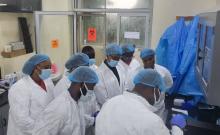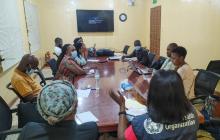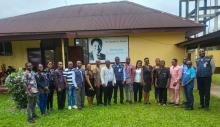Strengthening Liberia’s capacity to detect and manage epidemics through genomic sequencing and bioinformatics.
With support from the World Health Organization (WHO), the National Public Health Institute of Liberia (NPHIL) and the Ministry of Health concluded a residential hands-on in-country training on genomic sequencing and bioinformatics at the National Public Health Reference Laboratory (NPHRL) from 29 September to 19 October 2024 in Margibi County. Facilitated by a team of experts from the Noguchi Memorial Institute for Medical Research in Ghana, a total of 10 national laboratory technicians received a 2-week intensive training followed by a 1-week practice session.
Genomic surveillance plays a critical role in tracking emerging pathogen variants. It has become a fundamental global public health tool for detecting, monitoring, and responding to infectious disease outbreaks, as demonstrated by the severe acute respiratory syndrome coronavirus 2 (SARS-CoV-2) pandemic. During the in-country training, national laboratory scientists analyzed additional mpox-positive samples and detected another mpox strain, clade IIb.
“Before the training, we were reliant on international laboratories to identify the circulating pathogen strains. Now, we have the capability to conduct sequencing and bioinformatics analysis in-country, enabling us to rapidly identify emerging pathogens and their geographic origins," Francis Omega Somah, laboratory technologist at the National Reference Laboratory in Liberia.
This training is a significant milestone in the integration of pathogen genomics and bioinformatics into public health surveillance, outbreak detection, and investigation, which will enhance disease control and prevention efforts in Liberia. “This is a game-changer for the country as we will now have the national capacity to sequence and characterize pathogens of epidemic prone diseases in our country. We thank WHO for this strategic investment and their continuous technical and financial support towards strengthening Liberia's capacity to detect and manage epidemics," said Dr Dougbeh Nyan, Director General of NPHIL.
In 2022, WHO published a global genomic surveillance strategy to support countries in expanding their capacities. Unfortunately, 50% of Member States, including Liberia, lacked domestic sequencing capacity. To address this gap, WHO, under the AFRO HERA project, is supporting six African nations: Liberia, Burundi, the Central African Republic, Comoros, Eritrea, and Togo to establish and strengthen genomic sequencing and bioinformatics capacity, thereby expanding detection and genomic surveillance of epidemic-prone priority pathogens across the African Region. WHO has significantly invested on the continent in infectious disease and genomics surveillance.
“The most important aspect of capacity building is training the right experts. When a country has skilled professionals with the right platform, expertise, and infrastructure, they can respond swiftly and effectively to public health emergencies,” said Dr. Coulibaly Sheik, WHO AFRO Lead Diagnostic and Laboratory Services Unit.
Dr. Peter Clement, WHO Country Representative, thanked the team of facilitators and WHO AFRO for supporting Liberia through the EU-funded project which will strengthen the country’s laboratory systems. “By empowering local experts with the skills to conduct genomic sequencing and bioinformatics analysis, we are ensuring that Liberia is better prepared to rapidly identify emerging threats and implement timely interventions,” said Dr. Peter Clement, WHO Liberia Representative.
WHO Liberia
Email: inamahorobmutizwan [at] who.int (@who.int)
Epi-Surveillance/IDSR Team Lead
WHO-Liberia
+ (231)776106795
drmondayj [at] gmail.com (drmondayj[at]gmail[dot]com)






